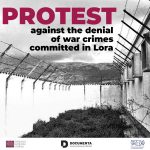
INITIATIVE TO PRESERVE THE MEMORY OF VLADIMIR BAROVIĆ: THE ADMIRAL WHO DEFENDED HONOR WITH HIS LIFE
29/09/2025IMPORTANT DECISION AGAINST REVISIONISM AND THE GLORIFICATION OF WAR CRIMINALS
02/10/2025STATEMENT REGARDING PLANNED COMMEMORATIVE ACTIVITIES FOR VICTIMS OF WAR CRIMES
The human rights organizations Documenta – Center for Dealing with the Past from Zagreb, the Center for Peace, Nonviolence and Human Rights from Osijek, and Human Rights Action from Podgorica call on Croatia’s Minister of Foreign and European Affairs, Gordan Grlić Radman, to use his participation in the 2BS Forum in Budva, on October 3 and 4, as an opportunity to advocate for the prosecution of all war crimes, including those committed at Lora camp. While the prosecution of war crimes falls within the judiciary’s mandate, we know how much it also depends on political will. Taking such a stance would send a strong message to the public in both Montenegro and Croatia that all crimes must be prosecuted and no victim should be forgotten.
Final court decisions in Croatia have established that members of the 72nd Military Police Battalion of the Croatian Army detained civilians and prisoners of war in Lora without any legal basis, subjected them to humiliation, psychological and physical abuse, torture, and corporal punishment, in some cases leading to their deaths. However, to this day, not all crimes committed in this camp have been investigated or prosecuted.
The County State Attorney’s Office in Split (CSAO) has been investigating for 18 years (since 2007), the suffering of captured Montenegrin army reservists who were taken prisoner in the Herzegovinian war zone in 1992 and brought to the Lora military investigative center in Split. This concerns fourteen members of the so-called Nikšić–Šavnik group, whose rights were protected under the Geneva Conventions and the laws of the Republic of Croatia. As prisoners of war, under international humanitarian law, they were supposed to be protected from torture and murder:
Radivoje Petković, Neđeljko Janković, Miljan Šušić, Ratko Simović, Duško Barović, Borivoje Zirojević, Dragoman Doknić, Radomir Vulić, Miloš Perunović, Ranko Vujović, Pavle Popović, Dragan Jakovljević, Luka Gazivoda, and Luka Adžić.
Additionally, it remains unknown whether CSAO has extended the investigation to the torture case of Montenegrin citizen Veselin Bojović, who was first questioned by competent authorities in 2012, and again in 2025 before the Special State Prosecutor’s Office of Montenegro, based on CSAO requests.
According to media reports, Minister Grlić Radman is planning to visit the Morinj site of suffering. We welcome that the Minister, together with his Montenegrin hosts, will lay flowers at the memorial to the victims of war crimes committed by members of the former JNA (Yugoslav People’s Army) in Morinj against civilians and prisoners of war from the Dubrovnik area. We remind that Montenegrin courts confirmed that an atmosphere of terror and fear for bare life prevailed in the Morinj camp, and four JNA members were convicted for the physical and psychological abuse of detainees.
Just as Montenegro must continue addressing crimes committed in Morinj camp and the Dubrovnik battlefield, Croatia has the obligation to finally fully acknowledge the crimes committed in Lora and to ensure justice for all victims. The severity of one crime cannot justify the relativization or diminishment of the suffering of victims of another. Only by acknowledging the truth about crimes committed on both sides can space be created for mutual respect and shared remembrance.
Therefore, we ask: When will conditions be created for the victims of Lora to be honored with the same dignity as the victims of Morinj?
At the same time, we are concerned by the calls for protests regarding the planned commemoration in Morinj. The organization Miholjski zbor has called on citizens to “resolutely and persistently oppose” Minister Radman’s visit and stated that it should not be allowed for “human garbage to trample on the honor of Boka and Montenegro” or for “false victims to be glorified in Morinj.” This kind of rhetoric, which insults and humiliates victims of war crimes and fuels hostility, is dangerous and unacceptable. We particularly condemn the insults directed at Minister Radman, as they undermine dialogue and send a message of intolerance.
Respect for the victims of one ethnic group must never be an obstacle to respecting victims of another – only by recognizing all victims and all crimes can we build peaceful and neighborly relations based on the rule of law.







 English
English